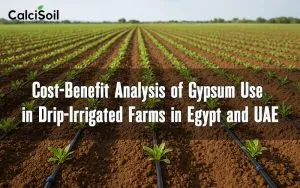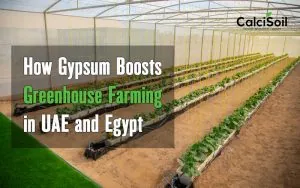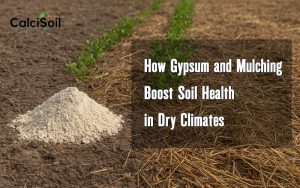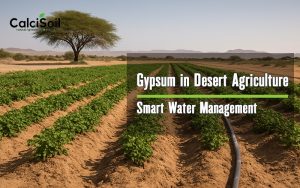
Gypsum effect application on soil fertility
If confirmed by laboratory results, the application of gypsum is not only necessary but should also be prioritized among farming practices, despite the associated costs. Gypsum, primarily composed of calcium sulfate dihydrate, plays a crucial role in soil fertility enhancement.
When applied, it increases the calcium concentration in the soil solution, which can lead to the formation of insoluble compounds that contain phosphorus or micronutrients. This process may render these essential nutrients unavailable to plants, highlighting the importance of careful consideration before applying gypsum.
Key Considerations for Gypsum Application
Application Rate
The rate at which gypsum is applied must be determined based on laboratory analyses. If high application rates are necessary, it is advisable to spread the recommended amount over a period of 2 to 3 years. This approach not only enhances application efficiency but also helps mitigate costs and prevents significant reductions in soil fertility, particularly concerning phosphorus loss.
Foliar Applications
To further reduce the risk of nutrient deficiencies after applying substantial amounts of gypsum, foliar applications of phosphorus and micronutrient compounds can be beneficial, especially in orchards. This technique ensures that plants receive adequate nutrition during critical growth periods.
Gypsum as a Soil Amendment
Given the chemical properties of many agricultural soils and irrigation water used in farming, gypsum application stands out as a vital soil amendment. The benefits derived from its application can lead to significant yield increases. However, it is essential that such applications be conducted under the guidance of experienced specialists who can assess laboratory results to optimize outcomes.
Benefits of Gypsum as a Soil Amendment
- Improved Soil Structure
Gypsum enhances soil structure by reducing compaction and improving water infiltration. This improvement facilitates root growth and nutrient uptake by plants, leading to healthier crops. - Reduced Soil Erosion
By improving soil structure and water infiltration, gypsum helps mitigate soil erosion. This is particularly important in agricultural settings where topsoil loss can severely impact productivity. - Increased Nutrient Availability
As gypsum dissolves in the soil, it releases calcium and sulfur—both essential nutrients for plant growth. This release contributes to improved soil fertility and supports robust plant development. - Reduced Aluminum Toxicity
In soils with high aluminum concentrations, gypsum can alleviate aluminum toxicity, promoting better root growth and overall plant health. - Enhanced Water Management
Gypsum improves the ability of soil to drain excess water and prevents waterlogging caused by high sodium levels or swelling clays. This property is especially beneficial during drought conditions, as it allows crops to utilize available moisture more effectively.
Conclusion
In summary, while the application of gypsum entails costs and requires careful management based on laboratory results, its benefits as a soil amendment are substantial. Improved soil structure, reduced erosion, increased nutrient availability, alleviation of aluminum toxicity, and enhanced water management make gypsum an invaluable tool for farmers aiming to boost soil fertility and crop productivity.
Therefore, prioritizing gypsum application within agricultural practices can lead to sustainable farming outcomes that support both crop health and environmental stewardship.







